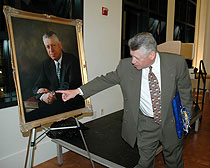January 31, 2005
Chemers listened to concerns of all while
focusing on the university’s mission
By Jennifer McNulty
An expert on leadership, Acting Chancellor Martin M. Chemers
says he was guided by his “commitment to the greater good”
during his tenure as chief executive on campus.
| See
photos of the reception for Acting Chancellor
Chemers. |

Acting Chancellor Martin M. Chemers points out a detail
in his official portrait, unveiled at a University Center
reception in his honor. Photo:
Louise Donahue |
Despite more than eight years as dean of the Division of Social
Sciences, Chemers said he’d never felt so keenly the pull
of UCSC’s numerous constituencies until he held the top
job.
“There are so many people who feel they should have influence
over the campus--undergraduates and graduate students, faculty,
staff, the unions, politicians, the alumni, parents, the Office
of the President, donors, and friends,” said Chemers.
“Some of them understand the mission of the university
very well and are committed to it, others are less knowledgeable,
and some have no interest in the mission at all. And they’re
all pushing on the chancellor.”
Chemers took time to meet with constituents and hear their
concerns, but his decisions always adhered to the university’s
mission of teaching, research, and public service.
From campus neighbors concerned about traffic to undergraduates
who oppose UCSC’s plans in Silicon Valley, Chemers made
inroads with agitated constituencies by listening. He dismissed
talk of his legacy but did say he’d be pleased if his work
“seeking the common good” was viewed as a model for
the campus.
“Trust is the bedrock of leadership, and trust is built
on honesty,” said Chemers, who was appointed campus provost/executive
vice chancellor after John Simpson departed and became acting
chancellor in April after M.R.C. Greenwood was named provost
of the University of California. “People will accept that
you don’t agree with them or aren’t going to do what
they want if you’ve told them the truth.”
Leaders need to be able to articulate a vision and explain
it in a way that everyone can relate to. “People want to
be heard, and they want the respect that is revealed when you
take the time to listen to them,” said Chemers. “I
told the students that Silicon Valley represents the greatest
concentration of wealth and intellect in the history of the
world, and we’d be crazy not to be a part of that. They
understood that.”
Working many 70-hour weeks, Chemers shared his passion and
commitment to higher education, and he inspired others to join
the effort. The hours were demanding, but the hardest part was
being criticized for things he hadn’t done.
“You get almost all bad news up here, and you have to
know how to control your emotions,” said Chemers, speaking
from the Chancellor’s Office in McHenry Library. Chemers
drew upon a tenet of the Iroquois Confederacy when times got
tough. “The Iroquois Confederacy had a representative form
of government before we did, and one of the things they require
of Confederate Lords is skin that is seven spans thick to be
proof against anger and recrimination.”
Chemers also spoke of Martin Luther King Jr. and his ability
to inspire individuals to overcome self-interest and work toward
the greater good. “It was not in anyone’s individual
best interest to march in Selma, but he had a way of tapping
their collective interest,” said Chemers. “Most people
who work in the university were called to a higher purpose,
and sometimes we have to remind them of that. We’re all
public servants.”
On a lighter note, Chemers credited his mother with instilling
in him a respect for punctuality. “My mother always told
me it was impolite to make people wait, and I’ve always
remembered that,” said Chemers, who regularly arrives early
for meetings and events.
Chemers described himself as a problem solver who likes working
as part of a team. The isolation of being at the top made him
particularly grateful for his advisers, among them Assistant
Chancellor William Hyder and Interim Campus Provost/Executive
Vice Chancellor Margaret L. Delaney. “Honesty is just as
important in your inner circle, and I’ve been very fortunate,”
he said.
After the arrival of Chancellor Designate Denice D. Denton
on February 14, Chemers plans to take sabbatical leave and return
to campus to teach in the Psychology Department in spring 2006.
Return to Front Page